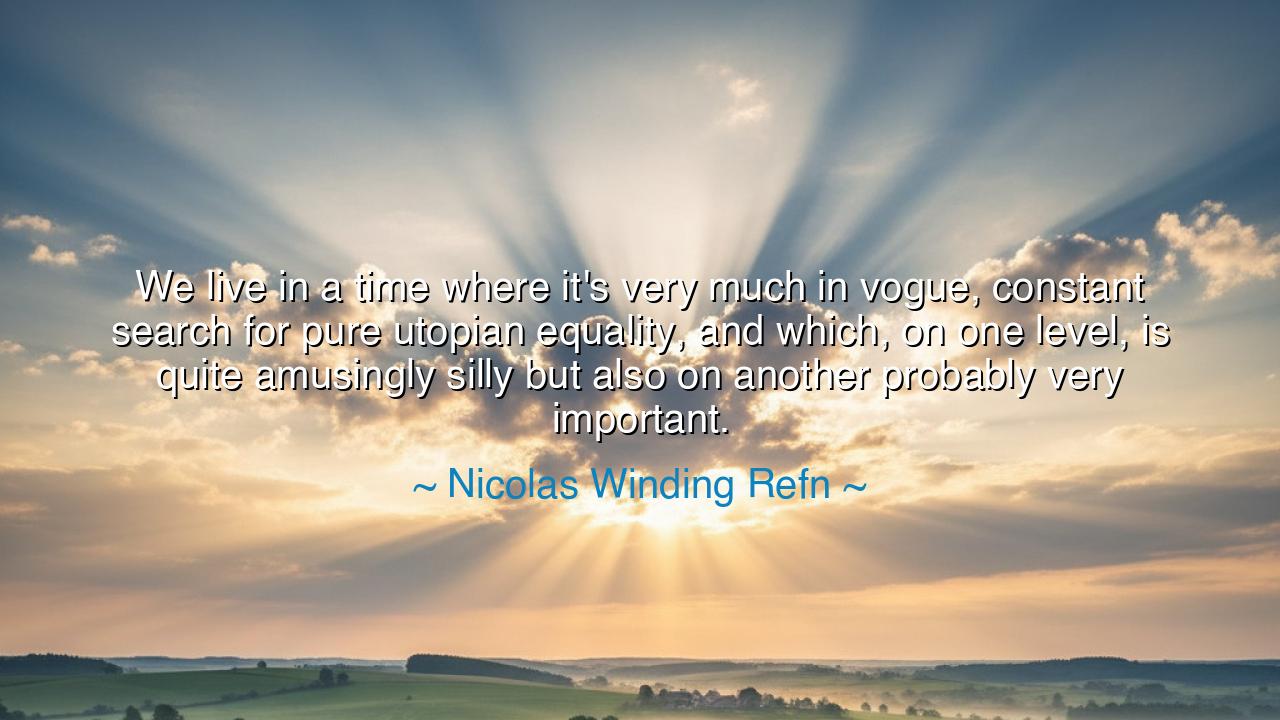
We live in a time where it's very much in vogue, constant search
We live in a time where it's very much in vogue, constant search for pure utopian equality, and which, on one level, is quite amusingly silly but also on another probably very important.






We live in a time—yes, a time unlike any other, where the quest for utopian equality has taken on a form both strange and powerful. It is a dream shared by many, this vision of a world where all are truly equal in every way, where no person is diminished or oppressed, where the ideals of fairness, justice, and freedom reign supreme. Yet, Nicolas Winding Refn speaks with a wisdom that cuts to the heart of our age, acknowledging the tension in our pursuit: that this dream, while lofty and noble, can seem, at times, to be silly—a fantasy that may never come to pass. And yet, he tells us, it is also important, perhaps more important now than ever before.
How can a vision so pure and desirable be both silly and important? Ah, this is the paradox we face. Utopian equality is not a new idea; it has been the subject of many a philosopher, poet, and ruler throughout history. Yet, it is perhaps more present now than ever, like a siren song that calls us to create a world of perfect harmony. But, as Refn observes, the pursuit of such a vision in our time can feel almost absurd—an impossible, overzealous quest for something that may forever remain just out of reach. For humanity, in its nature, is imperfect. We are driven by desires, by passions, and by egos, and to believe that all of these forces can be harmonized into perfect equality is, at times, a dream as fragile as the morning mist.
Consider the story of Plato, whose idealistic vision of the Republic sought to create a society where each person’s role was determined by their nature, and where all were equal in their duties and rights. Yet, even Plato himself knew that such a world was but a dream—a vision to strive toward, but not a reality to be fully attained. His wisdom lay in understanding that the pursuit of this ideal, while perhaps never fully realized, was the very thing that would push humanity toward higher ideals of justice, fairness, and cooperation. Utopian equality—though elusive—remains a guiding light, a reminder of what could be if humanity could rise above its baser instincts.
We see this same struggle today, in our modern world, as we grapple with the unequal distribution of power, wealth, and opportunity. The quest for equality is not one confined to a distant past or an ancient philosopher’s musings; it is a living, breathing force in our society today. Movements for gender equality, racial justice, and the rights of the marginalized are but a few examples of this ongoing search for balance. But Refn, in his reflection, reminds us that this search can sometimes become overwhelming, bordering on the absurd. Are we truly capable of attaining such a world? Can the inherent flaws of human nature ever be eradicated? The question lingers, and yet, even as we wrestle with it, we are forced to confront its importance.
Let us, however, not dismiss the struggle too easily, for therein lies its power. Even if we cannot attain the perfect equality we dream of, the pursuit itself drives us toward something greater than we were before. The abolition of slavery in the United States, though an imperfect victory, was a great step forward in our shared journey. In the face of fierce resistance, a handful of brave souls dared to believe that a nation built on freedom and justice could not thrive while its people remained enslaved. The emancipation of millions was, in itself, a victory—a manifestation of the deep desire for equality that has always lived in the heart of humankind.
So, too, does Refn’s wisdom call us to action. Utopian equality is, perhaps, an impossible summit, but it is one worth climbing. It is a vision that stirs the spirit and pulls us forward, compelling us to work toward a society where the bonds of inequality that divide us are loosened, even if they can never be fully cast off. It is an ideal that challenges us to examine the structures of our society, to push against the systems that perpetuate injustice, and to rise above the voices that say “it cannot be done.”
In our own lives, we must acknowledge the paradox of the quest for equality. We must strive to bring it into every corner of our existence, even when it seems an impossible goal. The actions we take, though they may seem small—advocating for fairness in the workplace, standing up against injustice in our communities, supporting those who are marginalized—are the very steps that carry us closer to the vision of a world where no one is left behind. Though the journey may never reach its utopian end, it is the striving, the relentless pursuit, that gives meaning to our shared existence.
So, let us take Refn’s words to heart: the search for equality is both silly and important, a truth that we must accept if we are to continue forward. Let us be both humble and bold in our quest, for though we may never reach the summit, the climb itself will forge a path for future generations, a path toward a more just and equal world. And in this, we find our purpose, our strength, and our hope.






AAdministratorAdministrator
Welcome, honored guests. Please leave a comment, we will respond soon